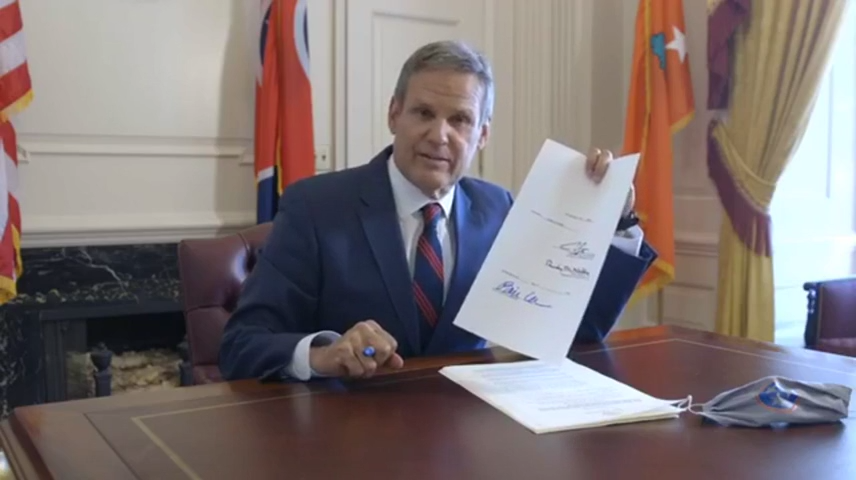Nashville DA Glenn Funk won’t enforce Tennessee abortion law, says it’s unconstitutional – Tennessean

| Nashville Tennessean

Nashville District Attorney Glenn Funk “will not enforce” Tennessee’s new abortion law requiring doctors to share controversial information about medication abortions because he considers it unconstitutional, according to a new filing in federal court.
The move drew condemnation from Republican Gov. Bill Lee, who signed the bill into law this summer, and praise from abortion rights advocates.
Among other things, the new state law requires clinics to notify patients that medication abortions, which are induced by pills, may be reversible. Providers who fail to do so could face criminal felony charges.
Abortion providers sued in August, saying the law violated their First Amendment rights by requiring them to share “false and misleading” information with their patients. There is no conclusive medical proof such a reversal is possible.
Funk and other local prosecutors were named as defendants because of their roles prosecuting criminal cases. The Nashville prosecutor’s filing sided with the providers, and broadly repudiated the state’s ongoing efforts to restrict abortion access as part of the same law.
“With regard to reproductive issues, the criminal law must not be used by the State to exercise control over a woman’s body,” Funk, a Democrat, wrote in a filing signed Wednesday.
“As long as I am the elected District Attorney for the 20th Judicial District, I will not prosecute any woman who chooses to have a medical procedure to terminate a pregnancy or any medical doctor who performs this procedure at the request of their patient.”
Funk’s argument broader than attorney general’s
While local prosecutors are typically represented by Tennessee Attorney General Herbert Slatery in federal court, Funk said the attorney general’s office refused to submit his declaration in the case.
So Funk submitted it to the court himself. Court staff logged the document Thursday.
Lee, who celebrated the legislation as “historic” when he signed it in July, slammed Funk on Twitter Thursday afternoon.
“A district attorney purposefully disregarding current, duly enacted laws by the legislature is a grave matter that threatens our justice system and has serious consequences,” Lee said without mentioning Funk by name. “The rule of law is the cornerstone of our legal system, and we all take an oath to uphold the law, not to pick and choose what laws to follow based on politics or personal feelings.”
Planned Parenthood of Tennessee and North Mississippi, an abortion provider and the lead plaintiff in the lawsuit, praised Funk’s filing in a statement from president and CEO Ashley Coffield.
“District Attorney Glenn Funk channeled the legacy of Justice Ruth Bader Ginsburg today and made a clear and unequivocal statement that politicians should not be criminalizing doctors and forcing them to spread false information with patients,” Coffield said.
Funk’s argument against abortion restrictions is far broader than the argument the Tennessee attorney general is pursuing in the lawsuit.
The attorney general’s argument, as outlined in the filings, is that abortion providers must notify patients that a medication abortion, called a “chemical abortion” in the legislation, could be reversed. But, the state said, providers are free to tell their patients they disagree with that required message.
Other local prosecutors named in the suit submitted declarations saying only that the law did not say providers who share the required message couldn’t also say they disagree with it.
Those prosecutors did not discuss the constitutionality of the requirement itself, and did not address abortion access more broadly. Funk’s decision to do both put him again at odds with state attorneys who would normally be his allies.
The Tennessee attorney general already is fighting one of Funk’s high-profile decisions in Nashville criminal criminal court, where he represents the state.
Last year, Funk brokered a deal to vacate a death sentence for a defendant facing execution. The Tennessee attorney general’s office stepped in and appealed that decision, seeking to reinstate the death penalty in the case. The matter is pending with a state appeals court.
Tennessee’s law one of the most restrictive in the country
Tennessee’s new abortion law is among the most restrictive in the country. It has been cheered by anti-abortion advocates and faced a barrage of criticism and legal fire from abortion rights advocates.
In addition to the requirement to discuss the reversal of medication abortions, the law places broad restrictions on when abortions can be performed. Those abortion restrictions are the subject of another ongoing lawsuit.
In particular, the law bans abortions if a fetal heartbeat can be detected, which can be as soon as six weeks after conception. The law imposes criminal penalties for anyone who provides an abortion outside of the state’s guidelines.
U.S. District Judge William L. Campbell, who is considering both cases, halted the implementation of broad swaths of the law while the legal challenges are underway.
The portion of the law requiring clinics to notify patients about abortion reversals is set to go into effect Oct. 1. The abortion providers want Campbell to temporarily block that provision as well. The judge said he would make the decision soon.
Reach Adam Tamburin at 615-726-5986 and atamburin@tennessean.com. Follow him on Twitter @tamburintweets.
